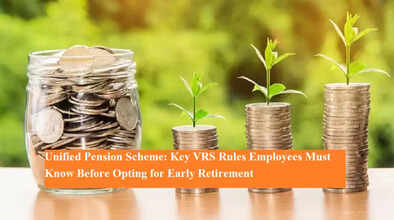Unified Pension Scheme: Key VRS Rules Employees Must Know Before Opting for Early Retirement

The Government of India introduced the Unified Pension Scheme (UPS) with the aim of consolidating different pension benefits under a single system. This scheme ensures that employees receive a guaranteed and secure income after retirement, providing financial stability regardless of market fluctuations or contribution gaps. However, when it comes to Voluntary Retirement Scheme (VRS), UPS has certain specific rules that every employee must understand before making the decision.
Why UPS Was Introduced
The Unified Pension Scheme was designed to simplify and streamline pension benefits, replacing the fragmented system of multiple retirement schemes. With UPS, employees are assured of timely pension disbursal, addressing one of the biggest shortcomings of older pension structures, where delays were common.
UPS provides a minimum pension guarantee, meaning employees can feel confident about post-retirement income even if their contributions were inconsistent or if markets perform poorly.
VRS Rules Under Unified Pension Scheme
Employees opting for voluntary retirement under UPS must fulfill certain age and service-related conditions to qualify for benefits. Pension entitlement is linked to the number of service years completed, ensuring fairness while protecting accrued benefits.
-
Service Period Requirement:
-
Employees must complete at least 20 years of service to be eligible for VRS benefits under UPS.
-
Earlier, the condition required 25 years of service, but UPS has reduced this threshold to make voluntary retirement more accessible.
-
-
Accrued Benefits Protection:
-
One of the key features of UPS is the protection of accrued pension benefits, which is particularly crucial for employees who choose to retire early.
-
-
Payment Structure for VRS:
-
On opting for VRS, employees can withdraw a lump sum of 10%.
-
The final withdrawal of 60% of benefits will be available at the time of retirement under VRS.
-
Full assured pension benefits are accessible only after 25 years of completed service.
-
Timely Disbursal of Pension
Unlike previous schemes, UPS has significantly reduced delays in pension disbursement. Now, pensions are usually released within one to three months after retirement or voluntary retirement. This ensures that retired employees do not face unnecessary financial hardships during the transition.
In case of the pensioner’s death before the assured pension starts, family pension benefits are provided. The spouse begins receiving payouts from the date of the pensioner’s demise, ensuring financial support continues uninterrupted.
Expert Advice: Think Before Opting for VRS
While UPS provides a safety net through guaranteed minimum pension, experts advise employees to carefully evaluate their decision before opting for voluntary retirement.
-
Employees should consider current financial liabilities, such as housing loans, education expenses, or other commitments.
-
Future financial needs, including healthcare and family obligations, must also be factored in.
-
Opting for early retirement without adequate planning can strain long-term financial security.
Key Takeaways
-
Minimum Pension Guarantee: Employees are assured of stable income after retirement.
-
VRS Eligibility: Requires at least 20 years of service.
-
Full Assured Pension: Available only after 25 years of service.
-
Timely Disbursal: Pensions are processed within 1–3 months, reducing bureaucratic delays.
-
Family Protection: In case of early demise, spouses receive family pension payouts.
Final Word
The Unified Pension Scheme has emerged as a more structured and employee-friendly retirement option, particularly with its minimum pension assurance and clear rules for voluntary retirement. However, employees should carefully weigh their financial situation before opting for VRS, ensuring that the decision supports both present needs and future security.

